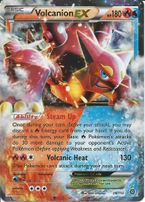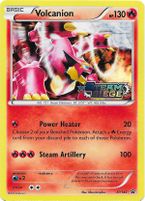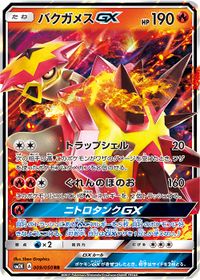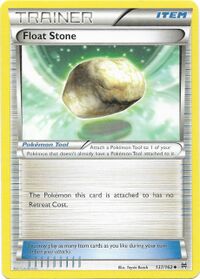Double Volcanion (TCG): Difference between revisions
mNo edit summary |
Thespeon196 (talk | contribs) m (→Strategy: relink of image) |
||
| Line 13: | Line 13: | ||
==Strategy== | ==Strategy== | ||
[[File: | [[File:MaxElixirBREAKpoint102.jpg|thumb|left|200px|{{TCG ID|BREAKpoint|Max Elixir|102}}]] | ||
Double Volcanion offered a never seen before synergy between the EX and non-EX version of the same Pokémon. The deck compesated low damage attacks thanks to {{TCG ID|Steam Siege|Volcanion-EX|26}}'s [[Ability#In_the_TCG|Ability]] , while attaching {{e|Fire}} Energy cards to Benched Pokémon thanks to {{TCG ID|Steam Siege|Volcanion|25}}'s first attack. Attacking with non-EX Pokémon and Knocking Out opponent's Pokémon EX, allowed the player to win the Prize Trade<ref>Prize trade, noun. An event that begins once both players’ boards are established to the point where they can use relevant attacks in succession until one player wins the game. It is no longer considered a Prize trade if one player misses a relevant attack, either because they whiffed a necessary card or because the opponent disrupted them.</ref>. | Double Volcanion offered a never seen before synergy between the EX and non-EX version of the same Pokémon. The deck compesated low damage attacks thanks to {{TCG ID|Steam Siege|Volcanion-EX|26}}'s [[Ability#In_the_TCG|Ability]] , while attaching {{e|Fire}} Energy cards to Benched Pokémon thanks to {{TCG ID|Steam Siege|Volcanion|25}}'s first attack. Attacking with non-EX Pokémon and Knocking Out opponent's Pokémon EX, allowed the player to win the Prize Trade<ref>Prize trade, noun. An event that begins once both players’ boards are established to the point where they can use relevant attacks in succession until one player wins the game. It is no longer considered a Prize trade if one player misses a relevant attack, either because they whiffed a necessary card or because the opponent disrupted them.</ref>. | ||
Latest revision as of 20:11, 19 August 2024
| Double Volcanion | ||||||||||
|---|---|---|---|---|---|---|---|---|---|---|
| ||||||||||
Double Volcanion was a Pokémon Trading Card Game deck archetype mainly played in the 2017-2018 season.
The deck's strategy revolved around the Volcanion-EX's Ability to discard ![]() Energy cards to increase damage done to the opponent's Active Pokémon, along with an efficient way to retrieve discarded Energy cards and to attach them to Benched Pokémon. Thanks to its fast set up and to its high damage cap (the player could easily hit the opponent's Pokémon for over 250 damages in one turn), Double Volcanion was heavyly played in tournaments, although it suffered for the presence of Night March and Greninja BREAK decks. Double Volcanion's best results were two 10th places at the 2016 Pokémon Trading Card Game World Championships and 2017 Pokémon Trading Card Game World Championships, but it went wery well in other events: it was in top 16 in almost every tournaments of the season 2016-2017 and 2017-2018, reaching more than once the 1st place, e.g. in the Hartford Regional Championship, CT, USA, September 2017.
Energy cards to increase damage done to the opponent's Active Pokémon, along with an efficient way to retrieve discarded Energy cards and to attach them to Benched Pokémon. Thanks to its fast set up and to its high damage cap (the player could easily hit the opponent's Pokémon for over 250 damages in one turn), Double Volcanion was heavyly played in tournaments, although it suffered for the presence of Night March and Greninja BREAK decks. Double Volcanion's best results were two 10th places at the 2016 Pokémon Trading Card Game World Championships and 2017 Pokémon Trading Card Game World Championships, but it went wery well in other events: it was in top 16 in almost every tournaments of the season 2016-2017 and 2017-2018, reaching more than once the 1st place, e.g. in the Hartford Regional Championship, CT, USA, September 2017.
Strategy
Double Volcanion offered a never seen before synergy between the EX and non-EX version of the same Pokémon. The deck compesated low damage attacks thanks to Volcanion-EX's Ability , while attaching ![]() Energy cards to Benched Pokémon thanks to Volcanion's first attack. Attacking with non-EX Pokémon and Knocking Out opponent's Pokémon EX, allowed the player to win the Prize Trade[1].
Energy cards to Benched Pokémon thanks to Volcanion's first attack. Attacking with non-EX Pokémon and Knocking Out opponent's Pokémon EX, allowed the player to win the Prize Trade[1].
Double Volcanion's engine is pretty simple: the player mainly focused on discarding ![]() Energy cards, not necessary with Volcanion-EX's Ability , and attacking with Volcanion. At the cost of one
Energy cards, not necessary with Volcanion-EX's Ability , and attacking with Volcanion. At the cost of one ![]() Energy card, the player was allowed to attach 2
Energy card, the player was allowed to attach 2 ![]() Energy cards from discard pile to two Benched Pokémon. This, along with Max Elixir, ensured that the Double Volcanion player usually had, at least, one Volcanion-EX or another Volcanion with three Energy attached to, even at their second turn. Fighting Fury Belt allowed the player's Pokémon to resist against opponent's attacks easily. Float Stone allowed the player's Pokémon to retreat Active Pokémon and to attack with those, full of Energy, remained in the Bench. Volcanion itself could Knock Out opponent's Pokémon: with four Benched Volcanion-EX and four Abilities activated, its first attack did 140 damage, from a base of 20, and attached 2
Energy cards from discard pile to two Benched Pokémon. This, along with Max Elixir, ensured that the Double Volcanion player usually had, at least, one Volcanion-EX or another Volcanion with three Energy attached to, even at their second turn. Fighting Fury Belt allowed the player's Pokémon to resist against opponent's attacks easily. Float Stone allowed the player's Pokémon to retreat Active Pokémon and to attack with those, full of Energy, remained in the Bench. Volcanion itself could Knock Out opponent's Pokémon: with four Benched Volcanion-EX and four Abilities activated, its first attack did 140 damage, from a base of 20, and attached 2 ![]() Energy cards to the Benched Volcanion-EX.
Lots of variants used Turtonator-GX: its GX attack sped up the set up even further, allowing the players for attaching to their Pokémon up to 5
Energy cards to the Benched Volcanion-EX.
Lots of variants used Turtonator-GX: its GX attack sped up the set up even further, allowing the players for attaching to their Pokémon up to 5 ![]() Energy cards from their discard pile. Due to the high amount of Energy cards used in Double Volcanion and due to the presence of cards like Professor Sycamore and Ultra Ball, it was easy, even on the first turn, to discard that number of Energy cards, then to attack with the Turtonator-GX's GX attack and so had a Bench of Volcanion(EX or non-EX) ready to attack.
One of the worst threats to this deck was Garbodor: under Ability lock down, Double Volcanion struggled to set up and to do decent damage.
It had some serious trouble with Greninja BREAK as well:Greninja's first attack locked down Abilities and both Volcanion-EX and Volcanion have
Energy cards from their discard pile. Due to the high amount of Energy cards used in Double Volcanion and due to the presence of cards like Professor Sycamore and Ultra Ball, it was easy, even on the first turn, to discard that number of Energy cards, then to attack with the Turtonator-GX's GX attack and so had a Bench of Volcanion(EX or non-EX) ready to attack.
One of the worst threats to this deck was Garbodor: under Ability lock down, Double Volcanion struggled to set up and to do decent damage.
It had some serious trouble with Greninja BREAK as well:Greninja's first attack locked down Abilities and both Volcanion-EX and Volcanion have ![]() Weakness.
Weakness.
There were several other cards that were major components of Double Volcanion deck. Energy Retrieval allowed for easy enercgy recycle, Super Rod did it too. Field Blower allowed for discarding tools attached to opponent's Garbodor, denying the effect of Garbotoxin. Hoopa-EX or Brooklet Hill rose the chance to bench Volcanion-EX or Starmie.
A good set up was considered achieved when the Double Volcanion player had at least two Volcanion-EX on the field, a Volcanion, as Active Pokémon, ready to attack and at least two ![]() Energy cards in the discard pile. Having in the hand Max Elixir, spare
Energy cards in the discard pile. Having in the hand Max Elixir, spare ![]() Energy cards and Float Stone, helped too.
Energy cards and Float Stone, helped too.
Key cards
- Volcanion-EX - Volcanion-EX's Steam Up Ability allowed, once per turn, the player's Basic
 Pokémon to do 30 more at the cost of discarding a
Pokémon to do 30 more at the cost of discarding a  Energy card. This was commonly used both to discard
Energy card. This was commonly used both to discard  Energy cards for fueling Volcanion's first attack and to power up the damage output. Its attack did 130 damage, cost 3
Energy cards for fueling Volcanion's first attack and to power up the damage output. Its attack did 130 damage, cost 3  Energy cards and placed on the Pokémon the effect that it couldn't attack the next turn.
Energy cards and placed on the Pokémon the effect that it couldn't attack the next turn. - Volcanion - Volcanion's attack Power Heater did 20 damage and allowes the player to attach 2
 Energy cards from their discard pile to two of their Benched Pokémon. Steam Artillery hit for 100 damages.
Energy cards from their discard pile to two of their Benched Pokémon. Steam Artillery hit for 100 damages. - Turtonator-GX - Turtonator-GX's first attack allowed the player to both hit for 20 damage and place on Turtonator-GX an effect: if this Pokémon was damaged by an attack, the player put 8 damage counters on the Attacking Pokémon. It was used to counter Jolteon-EX, which was a big threat for deck focused on Basic Pokémon only, in season 2017-2018. Its second attack hit for 160 damage, discarding 2
 Energy. Its GX attack allowed the player, for one
Energy. Its GX attack allowed the player, for one  Energy only, to attach five
Energy only, to attach five  Energy cards from their discard pile to their Pokémon.
Energy cards from their discard pile to their Pokémon. - Max Elixir - This item allowed the player to look at the top 6 cards of their deck and to attach a basic Energy card they find there to a Basic Pokémon on their Bench.
- Float Stone - It allowed the player to free retreat their Pokémon. It was a key cards because this deck contained Pokémon with high retreat costs and the player often wanted to switch the Active Volcanion for a Benched, but ready to attack, Volcanion EX. Also, it allowed an easy way to bypass the Volcanion-EX's attack's effect
- Field Blower - It allowed the player to discard Pokémon tool cards or Stadium cards in play. It was a life saver against Garbodor.
- Brooklet Hill - Brooklet Hill was used to search
 Basic Pokémon and put them on the Bench. It allowed the player to benching Volcanion-EX and, if used, Staryu or Remoraid.
Basic Pokémon and put them on the Bench. It allowed the player to benching Volcanion-EX and, if used, Staryu or Remoraid. - Energy Retrieval - It retrieved 2
 Energy cards from the discard pile easily allowing multiple Steam Up in one turn.
Energy cards from the discard pile easily allowing multiple Steam Up in one turn.
Typical decklist
Igor Costa's decklist at the 2017 - Regional Championship Hartford, CT, USA
| Quantity | Card | Type | Rarity |
|---|---|---|---|
| 4× | Volcanion |
||
| 4× | Volcanion | ||
| 2× | Turtonator |
||
| 2× | Tapu Lele |
||
| 1× | Oranguru | ||
| 4× | Professor Sycamore | Su | |
| 4× | Guzma | Su | |
| 4× | N | Su | |
| 1× | Lillie | Su | |
| 4× | Ultra Ball | I | |
| 4× | Max Elixir | I | |
| 2× | Enhanced Hammer | I | |
| 1× | Field Blower | I | |
| 1× | Switch | I | |
| 1× | Super Rod | I | |
| 2× | Float Stone | I | |
| 4× | Fighting Fury Belt | I | |
| 15× | Fire Energy | ||
Possible tech cards
The following cards are often used in Double Volcanion in place of certain cards included in the above lists.
- Starmie - Starmie's Ability Space Beacon retrieved 2 discarded Energy cards, similar to the Energy Retrieval Item cards.
- Octillery - Octillery's Abyssal Hand Ability allowed the player to draw cards.
- Entei - Its first attack 'Burning Roar' was used as altenative way to attach
 Energy cards to Pokémon. Its second attack Combat Blaze hit for a number of damage which depends on the number of opponent's Benched Pokémon. For only two
Energy cards to Pokémon. Its second attack Combat Blaze hit for a number of damage which depends on the number of opponent's Benched Pokémon. For only two  Energy, along with the Volcanion-EX's Ability, Combat Blaze easily hit for 180 damage or more.
Energy, along with the Volcanion-EX's Ability, Combat Blaze easily hit for 180 damage or more. - Pokémon Ranger - It allowed the player to counter both Jolteon-EX and the negative effect of Volcanion-EX's attack 'Volcanic Heat'.
- Blacksmith - It allowed the player to attach 2
 Energy cards from their discard pile to 1 of
Energy cards from their discard pile to 1 of  Pokémon. Staple in 2016-2018 Expanded format variants.
Pokémon. Staple in 2016-2018 Expanded format variants. - Kiawe - It allowed the player to attach up to 4
 Energy cards from their deck, at the cost of ending their turn.
Energy cards from their deck, at the cost of ending their turn. - Scorched Earth - Often used as a draw engine.
Notes
- ↑ Prize trade, noun. An event that begins once both players’ boards are established to the point where they can use relevant attacks in succession until one player wins the game. It is no longer considered a Prize trade if one player misses a relevant attack, either because they whiffed a necessary card or because the opponent disrupted them.

|
This article is part of Project TCG, a Bulbapedia project that aims to report on every aspect of the Pokémon Trading Card Game. |





